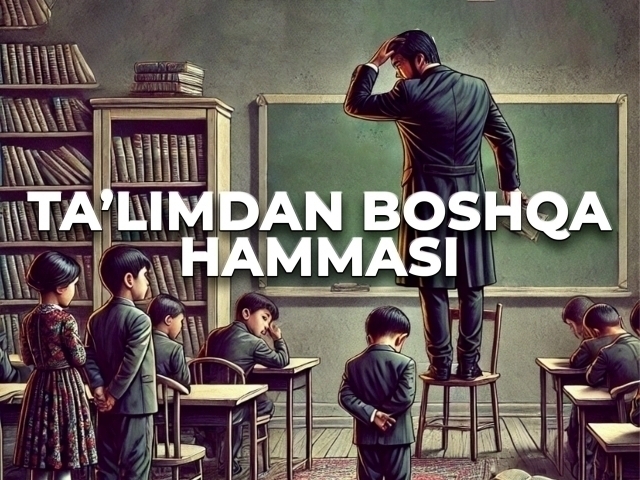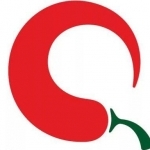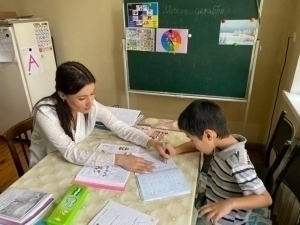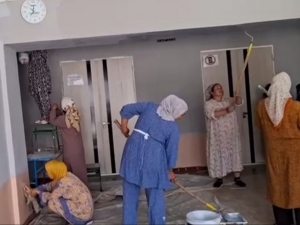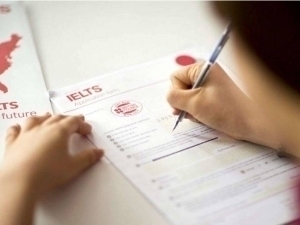Controversy over uniforms: Tashkent’s vision and Karshi’s principal
Review
−
29 January 2025 30009 11 minutes
"To give life to one look." The mayor of Tashkent wants to “dress up” the city’s residents, while the principal of a school in Karshi wants to “dress up” his students. The frequently debated issue of school uniforms is back on the agenda. Today, we will discuss the similar approaches taken by different institutions. You may have seen the video of a school principal instructing class leaders to collect money from parents for jackets—without any “wiji-wiji.” The video shows the principal of School No. 23 in Karshi, F.Sh., organizing a uniform collection drive in the middle of the school year. He begins by saying, “First, get the students in one frame,” before ordering class leaders to collect 70,000 sums from parents.
"If there is talk of 'wiji-wiji,' don’t be upset with me. So, all of you, follow the instructions. I gave the tailor’s contact information to the deputy principal, Shakhnoza. The uniforms will arrive tomorrow. I will send the emblem I have chosen to the group. Not a single student should be left out. If they don’t have the uniform, I will throw them out the door. I don’t need students without uniforms," he says in the video.
Shortly after, the regional State Educational Service announced that the school principal had been fined 25 percent of the average monthly salary. For reference, the current average monthly salary is 5,357,000 sums. Another noteworthy aspect is the principal’s tone and manner of speaking to the teachers. His choice of words and lack of professionalism are far from the behavior expected of a school leader. This incident serves as yet another example of the declining status of teachers—who are already among the lowest-paid professionals in the country—and the erosion of respect for them in society, starting with their own pedagogical leaders.
Is it easy to be a teacher?
Issues such as school uniforms, excessive fees, illegal orders, and the rude behavior of administrators are nothing new. Many teachers have come to accept unlawful practices, including collecting votes for the "Open Budget" initiative, sweeping the streets, and being forced to participate in events, as part of their job. Teachers are responsible for much more than just educating students. They must manage uniforms, monitor attendance, maintain order in classrooms, complete both electronic and bureaucratic paperwork, communicate with parents, and work on their own professional development. However, their primary responsibility—imparting knowledge—has been pushed to the bottom of the priority list. As a result, exhausted and frustrated teachers enter the classroom. Building a connection with today’s Generation Z and Alpha students is no easy task. According to one teacher we spoke with, the first thing teachers are asked about is not education, but uniforms, attendance, and discipline.
"So far, I have no complaints about our school’s management—everything is fine. However, students are not interested in learning, especially those in the upper grades who just want to graduate quickly and start earning money, even if it means going abroad. Everyone is glued to their phones. Almost all decisions favor the students, and teachers have little authority. We can’t even give students a small reprimand—it’s very difficult to maintain order in the classroom. If I had a say, I would suggest that illiterate students be removed from regular classes and given remedial education. Many students attend school just to pass the time; they don’t study at all. The fact that the National Guard now oversees attendance has made things much easier," he says.
Education, alongside healthcare, remains one of the lowest-paid sectors in Uzbekistan. On the other hand, these two sectors employ more people than any other in the country. According to Deputy Minister of Education and Science Temurjon Kamilov, raising the salary of each teacher by just 1 million sums would cost the national budget 7 trillion sums per year. According to the Statistics Agency, the average salary in the education sector is currently 3,637,000 sums. It’s worth remembering that there was once a promise to raise teachers' monthly salaries to $1,000. Hilola Umarova addressed this issue at a press conference on August 28 last year.
"But I have to say one thing: we also have teachers who earn more than $1,000. Each field has its own KPIs. In our preschool education system, for example, teachers follow different tracks. If they hold a high category, they receive an additional salary. If a student wins an Olympiad, I will also award a prize. Now, funds have been allocated for certifications, including language and other qualifications," he said.
At the same conference, it was stated that out of nearly 545,000 teachers, more than 6,000—just 1.1 percent—earn a salary exceeding $1,000.
Is the uniform mandatory?
In recent years, numerous government decisions have been made regarding whether school uniforms should be mandatory or optional, making it easy to lose track of the current policy. Let’s clarify the situation. On August 15, 2018, the Cabinet of Ministers issued a resolution stating that school uniforms would be introduced as optional starting from the 2018–2019 academic year and would become mandatory from the 2022–2023 academic year. However, in May 2019, Saida Mirziyoyeva, then Deputy Director of the Agency for Information and Mass Communications, argued that it was too soon to enforce a mandatory uniform policy. She emphasized that other, more pressing issues in the education system should take priority over school uniforms.
"As a result of our studies, we found that conditions in some areas are difficult: many schools are in need of repairs, there is a shortage of textbooks, the quality of books is very low, and some schools operate in three shifts. Starting this year, a mandatory school uniform is planned to be introduced. However, we believe it is too early to enforce this requirement without first addressing these existing shortcomings. In short: conditions first, requirements later," Saida Mirziyoyeva wrote in a Facebook post.
Following this, on June 18, 2019, the Cabinet of Ministers adopted Resolution No. 509, which postponed the introduction of the mandatory school uniform from the 2019–2020 academic year to the 2024–2025 academic year. However, on May 19, 2022, the government issued Resolution No. 271, announcing that the mandatory uniform policy would instead take effect from the 2022–2023 academic year. This decision sparked opposition from both parents and the general public. In response to these objections, the Cabinet of Ministers issued Resolution No. 558 on October 3, 2022, officially canceling the requirement to enforce a single school uniform starting from the 2022–2023 academic year. Instead, the policy would be implemented gradually, though the resolution did not specify an exact date for full enforcement. Now, with the second half of the 2024–2025 academic year already underway, the debate over school uniforms has resurfaced.
One particularly noteworthy aspect of this controversy is that the fined school principal, in the viral video, cited several schools in the city—specifically Schools No. 34, 1, 11, 8, and 5—as examples of institutions that had already introduced a mandatory uniform policy. This raises the question: Is the enforcement of a uniform policy the personal initiative of these school principals, or is it an order from higher authorities? A school principal from another region told QALAMPIR.UZ that the directive came from above, stating that a mandatory school uniform policy would take effect in 2025. Additionally, when we asked several school teachers and class leaders, they also confirmed that wearing a uniform is now mandatory in schools. Interestingly, while the Kashkadarya regional State Educational Service responded to the viral video by strictly prohibiting the collection of money for compulsory uniforms, it did not clarify whether students could still be forced to wear them.
Are school uniforms good or bad?
Studies suggest that when all students wear the same clothing, classrooms appear more organized, students are quieter, and they pay more attention. While such findings may be encouraging for teachers, some experts argue that mandatory uniforms can hinder children's ability to express their opinions and personal choices. According to these experts, children—especially adolescents—use their appearance to reflect their inner emotions, personality, and worldview. Forcing them to wear uniforms restricts their self-expression and may limit their ability to think critically and creatively. While some studies claim that school uniforms help reduce social inequality and bullying among students, others dismiss these claims as unfounded. Additionally, some experts highlight that there is no statistical evidence proving that students who wear uniforms perform better academically. Environmentalists also point out that school uniforms are often made from synthetic materials containing harmful chemicals, which can contaminate water sources and soil, leading to significant environmental damage.
How much is invested in education?
According to UNESCO, 250 million children and young people worldwide are out of school, and 763 million adults remain illiterate. To address these global education challenges and promote modernization, January 24 has been designated as International Education Day.
Like many other countries, Uzbekistan invests heavily in education. According to the law On the State Budget of the Republic of Uzbekistan, approximately 50 trillion sums were allocated to the Ministry of Preschool and School Education for 2024. This budget was intended to cover:
- Updating textbooks and outdated computers in schools,
- Providing tablets to primary school students in the Kushkopir and Khanka districts,
- Purchasing sports equipment and musical instruments for schools,
- Other general expenses.
So, have your schools received updated textbooks and computers? Have they been equipped with sports gear and musical instruments? And most importantly, did students in Khanka and Kushkupir receive their promised tablets?
This year, the Ministry of Preschool and School Education is set to receive an even larger budget—about 60 trillion sums. Despite frequent criticism, the education system, or more specifically, the Ministry of Preschool and School Education, ranks second in budget allocation, following the Ministry of Economy and Finance, which has been granted 96 trillion sums.
"National Initiatives" of officials
If you think dress codes apply only to educational institutions, you are mistaken. Dressing appropriately for one's profession and workplace—comfortably and in accordance with etiquette—is generally not an issue. However, unexpected changes sometimes arise.
For example, under a resolution signed by Tashkent Governor Shavkat Umurzakov, the "National Tashkent" project will be implemented, encouraging employees of state offices in the city to wear national attire. As part of this initiative:
- City public transport and transport cards will be decorated with national ornaments.
- Each school in the city will have at least one "National Uzbek Class" as a model example.
- The facades and interiors of shopping centers, markets, recreation parks, museums, cinemas, and theaters will be designed in a nationalist style.
- A competition for short social videos, blogs, and flash mobs will be launched under the slogan "Nationality is in trend in Tashkent."
Does this decision remind you of something? If not, let us refresh your memory.
In 2021, then-Minister of Culture Ozodbek Nazarbekov introduced an initiative encouraging ministry employees to wear turbans at work, calling it a "revival of values." Similarly, it is impossible to ignoreAndijan Governor Shukhrat Abdurakhmanov’s call for people to dance to the Andijan Polka. In honor of the 100th anniversary of the dance and the 65th anniversary of the folk dance ensemble of the same name, the governor declared an official "Andijan Polka Month" across the region.
Thus, the debate over appearance and clothing—with conflicting opinions and no consensus—continues as always. According to public activists, officials should recognize that substance matters more than form.
Iqbol Ergashova
Live
All